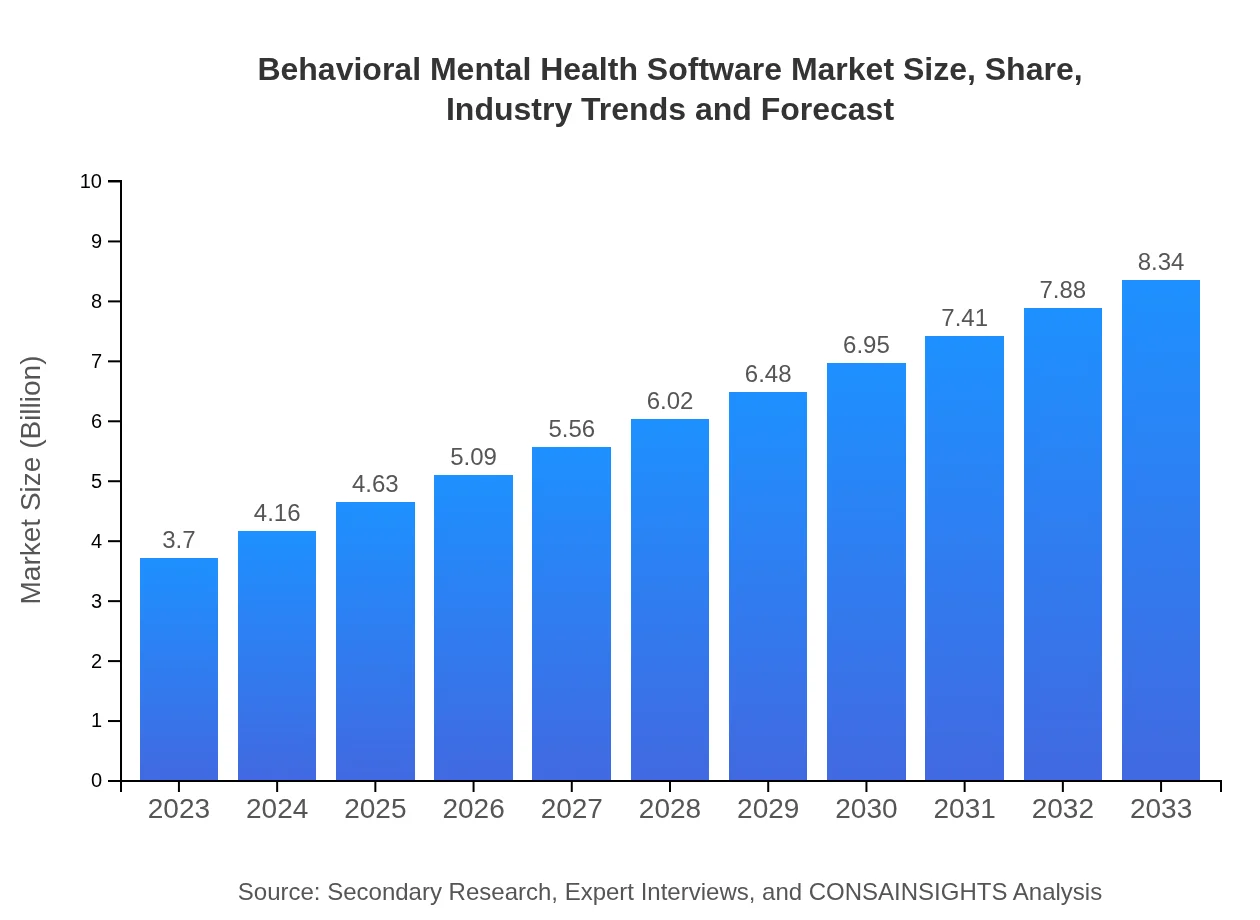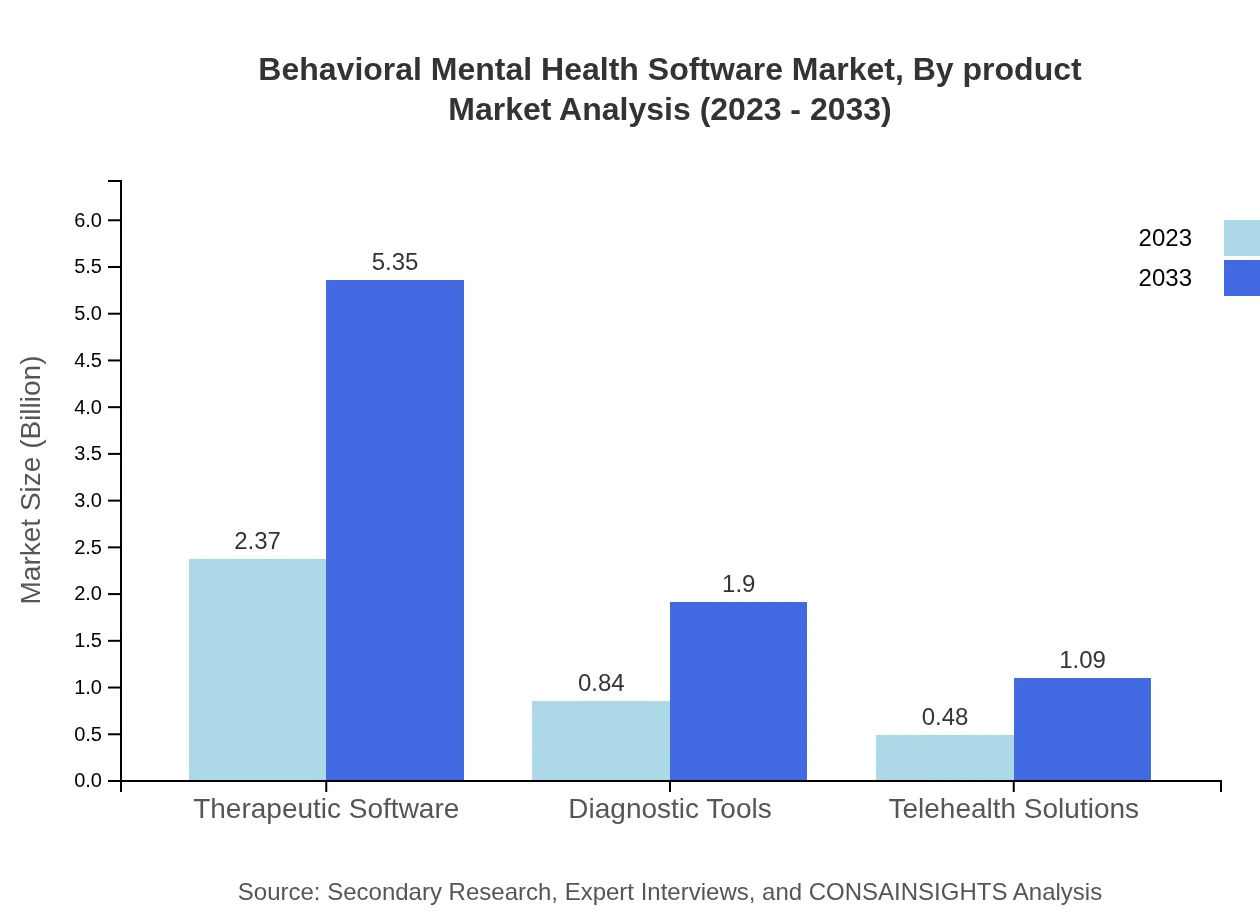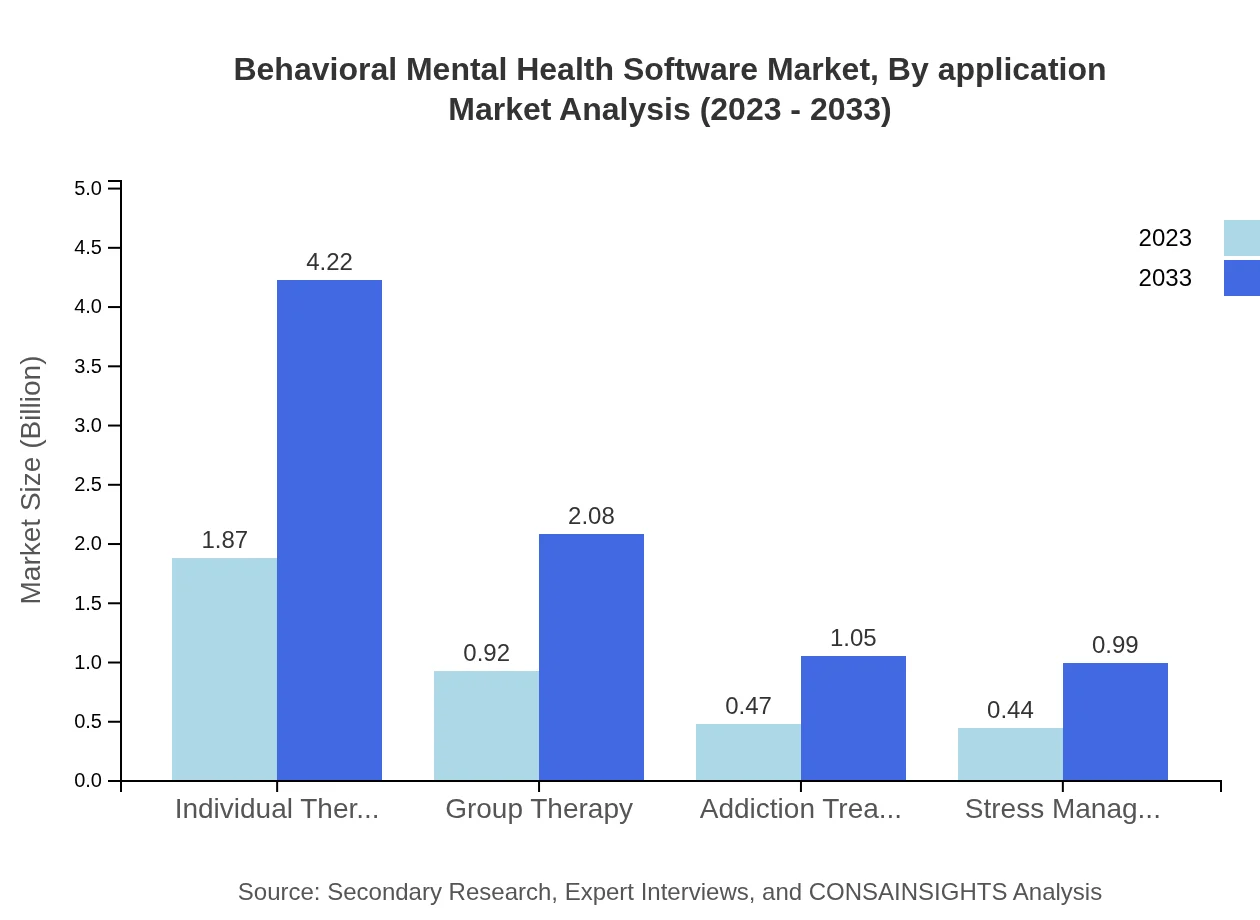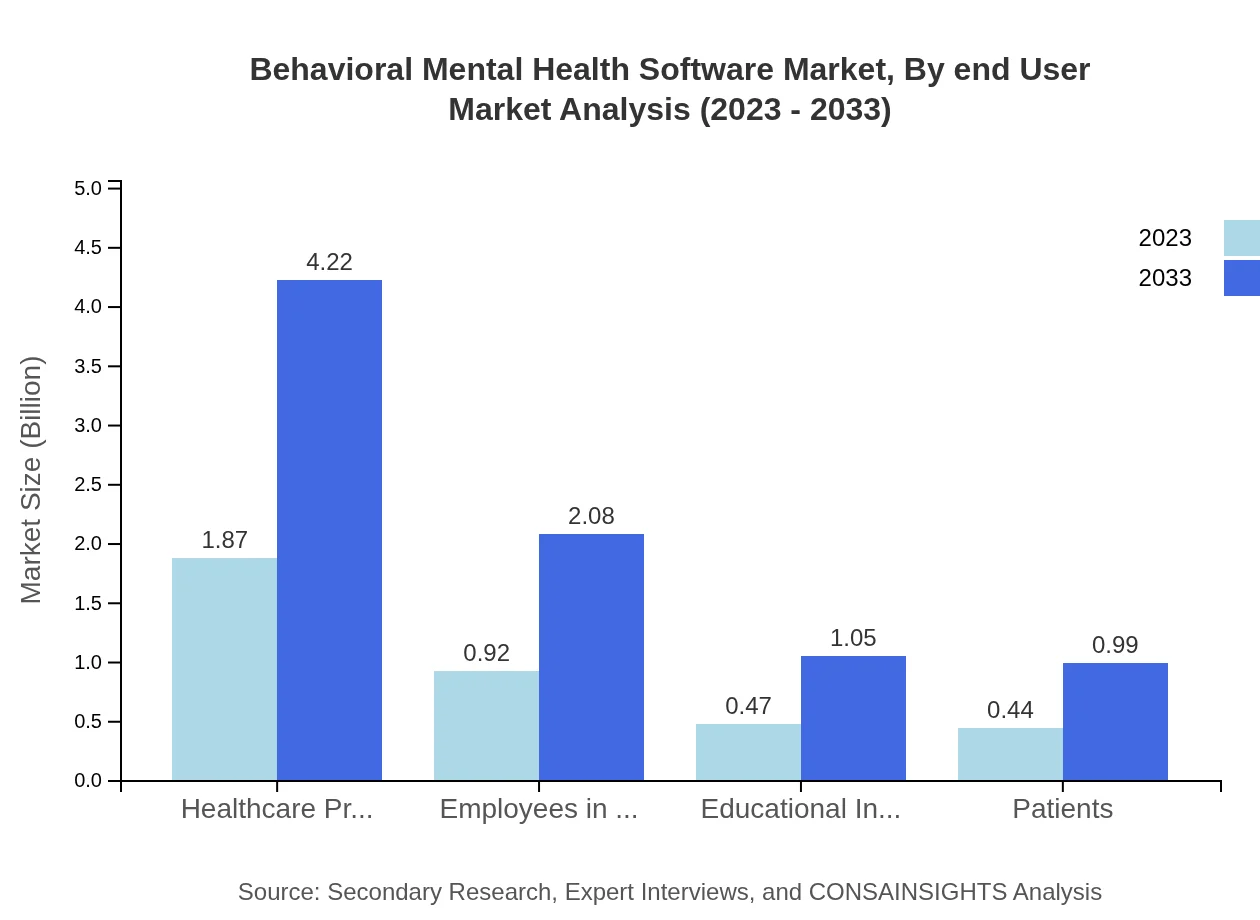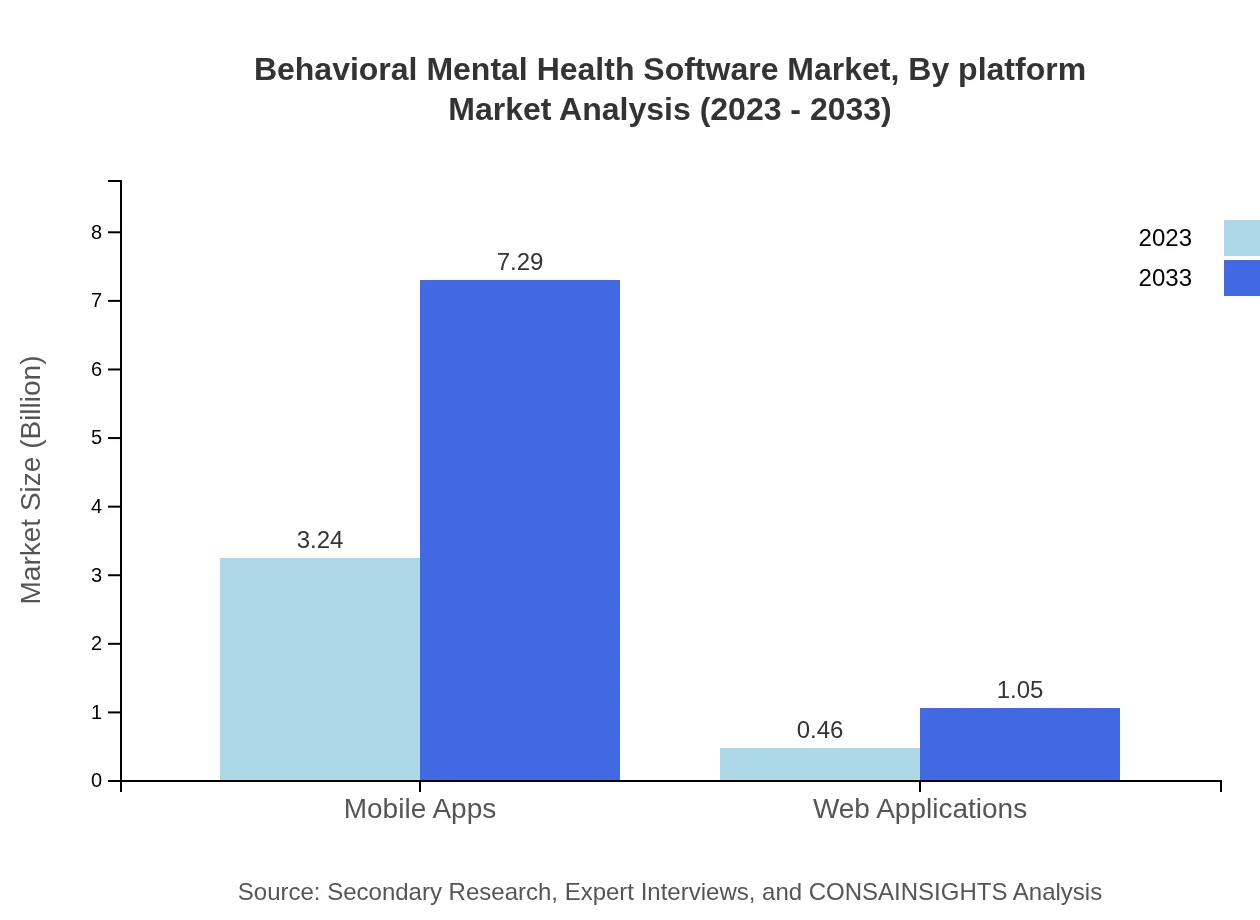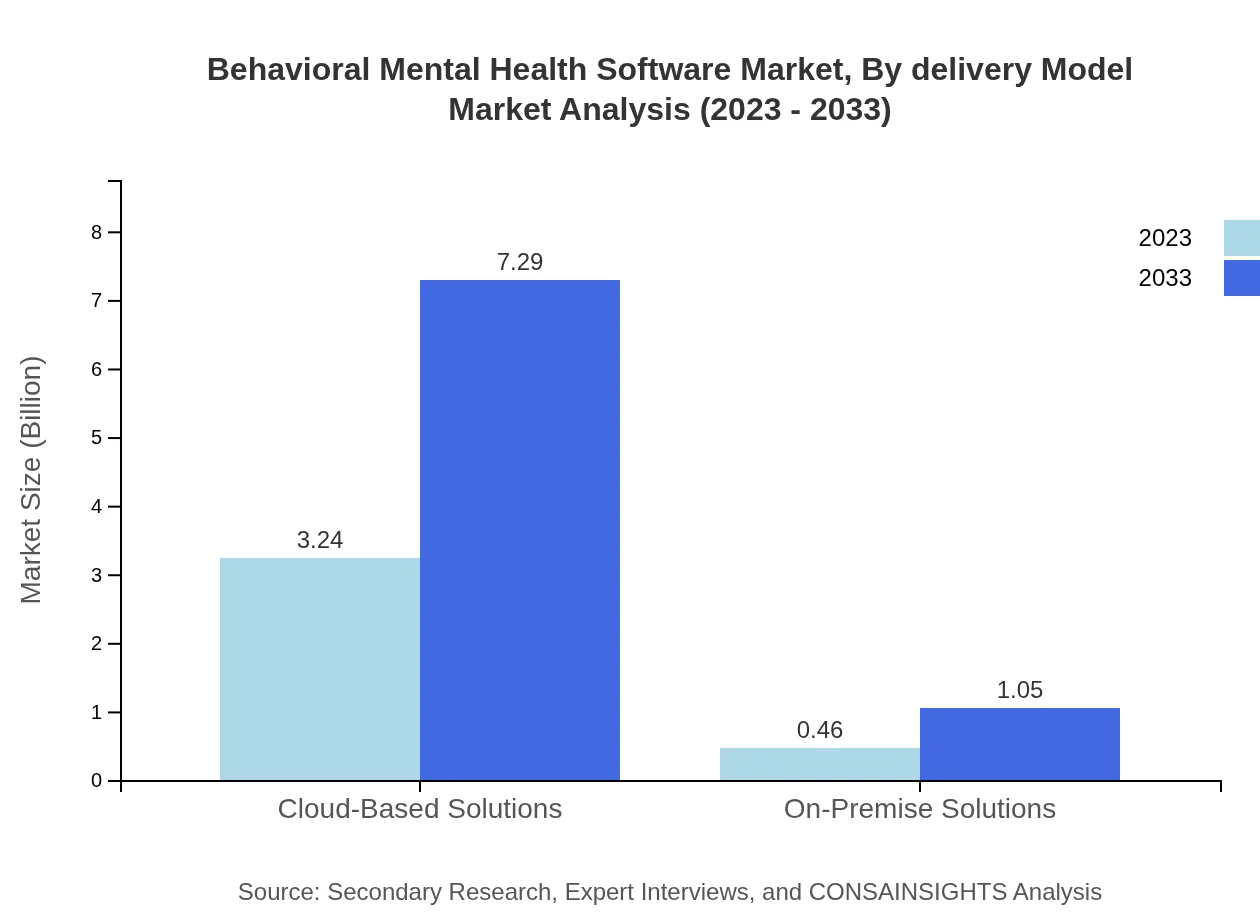Behavioral Mental Health Software Market Report
Published Date: 31 January 2026 | Report Code: behavioral-mental-health-software
Behavioral Mental Health Software Market Size, Share, Industry Trends and Forecast to 2033
This report provides an extensive analysis of the Behavioral Mental Health Software market from 2023 to 2033, offering insights on market trends, segmentation, regional analysis, and forecasts. Comprehensive data is included to understand the depth and potential of this growing sector.
| Metric | Value |
|---|---|
| Study Period | 2023 - 2033 |
| 2023 Market Size | $3.70 Billion |
| CAGR (2023-2033) | 8.2% |
| 2033 Market Size | $8.34 Billion |
| Top Companies | Talkspace, Headspace, BetterHelp, Lemonaid Health |
| Last Modified Date | 31 January 2026 |
Behavioral Mental Health Software Market Overview
Customize Behavioral Mental Health Software Market Report market research report
- ✔ Get in-depth analysis of Behavioral Mental Health Software market size, growth, and forecasts.
- ✔ Understand Behavioral Mental Health Software's regional dynamics and industry-specific trends.
- ✔ Identify potential applications, end-user demand, and growth segments in Behavioral Mental Health Software
What is the Market Size & CAGR of Behavioral Mental Health Software market in 2023?
Behavioral Mental Health Software Industry Analysis
Behavioral Mental Health Software Market Segmentation and Scope
Tell us your focus area and get a customized research report.
Behavioral Mental Health Software Market Analysis Report by Region
Europe Behavioral Mental Health Software Market Report:
Europe’s market is expected to grow from $1.29 billion in 2023 to $2.90 billion by 2033, influenced by stringent regulations advocating for mental health services and a growing trend of integrated care models.Asia Pacific Behavioral Mental Health Software Market Report:
The Asia Pacific region is projected to experience considerable growth from $0.70 billion in 2023 to $1.57 billion by 2033. Factors contributing to this growth include rising mental health awareness, increasing investments in telehealth infrastructure, and governmental support for mental health initiatives.North America Behavioral Mental Health Software Market Report:
North America currently leads the market, valued at $1.19 billion in 2023 and expected to reach $2.68 billion by 2033. This growth is driven by a robust healthcare system, high disposable incomes, and a strong emphasis on mental health and wellness.South America Behavioral Mental Health Software Market Report:
In South America, the market is expected to grow from $0.14 billion in 2023 to $0.31 billion in 2033. The growth is fueled by improved access to technology and the increasing focus on mental health services as part of healthcare reforms.Middle East & Africa Behavioral Mental Health Software Market Report:
The Middle East and Africa are anticipated to expand from $0.39 billion in 2023 to $0.88 billion by 2033, supported by emerging health sectors and increasing health technology adoption.Tell us your focus area and get a customized research report.
Behavioral Mental Health Software Market Analysis By Product
In 2023, the Therapeutic Software segment dominates the market at $2.37 billion with a forecast to grow to $5.35 billion by 2033. Diagnostic Tools follow at $0.84 billion, projected to reach $1.90 billion. Telehealth Solutions start at $0.48 billion and are expected to increase to $1.09 billion, demonstrating the shift toward remote care. Mobile Apps account for a significant share, while Cloud-Based Solutions dominate given their scalability and accessibility.
Behavioral Mental Health Software Market Analysis By Application
The Individual Therapy segment leads with a market size of $1.87 billion in 2023, expanding to $4.22 billion by 2033. Group Therapy and Stress Management show substantial growth patterns, with both segments emphasizing the need for collaborative and preventive care. Educational Institutions and Corporate Employees are emerging as critical markets amid evolving workplace wellness strategies.
Behavioral Mental Health Software Market Analysis By End User
Healthcare Providers represent a significant user base, valued at $1.87 billion in 2023, and maintaining a steady growth towards $4.22 billion. Corporate employees and patients also constitute large segments, each reflecting the demand for improved mental health resource access across different demographics.
Behavioral Mental Health Software Market Analysis By Platform
Cloud-based solutions dominate the platform segment, projected to grow from $3.24 billion in 2023 to $7.29 billion by 2033. On-premise solutions remain relevant but show slower growth, indicating a shift towards more flexible and accessible options.
Behavioral Mental Health Software Market Analysis By Delivery Model
The push towards mobile applications is evident, reflecting the behavioral shift in consumer preferences. Therapeutic applications dominate this aspect as well, presenting a significant opportunity for developers focusing on innovative user experiences. Delivery models increasingly favor subscription-based access, enhancing user engagement and accessibility.
Behavioral Mental Health Software Market Trends and Future Forecast
Tell us your focus area and get a customized research report.
Global Market Leaders and Top Companies in Behavioral Mental Health Software Industry
Talkspace:
A leading online therapy platform that connects users with licensed therapists through text and video sessions, emphasizing accessibility and convenience in mental health care.Headspace:
Known for its meditation and mindfulness applications, aiming to improve mental wellness through guided practices and resources aimed at effecting behavioral change.BetterHelp:
An online counseling platform that provides affordable and accessible counseling services through various communication modes focusing on flexibility and user choice.Lemonaid Health:
Provides telehealth services with a particular focus on mental health, offering a range of treatment options and pharmaceuticals through a streamlined online platform.We're grateful to work with incredible clients.









FAQs
What is the market size of behavioral Mental Health Software?
The behavioral mental health software market is currently valued at approximately $3.7 billion with a projected CAGR of 8.2% from 2023 to 2033, indicating significant growth opportunities ahead.
What are the key market players or companies in this behavioral Mental Health Software industry?
Key players in the behavioral mental health software industry include software developed by healthcare providers, diagnostic tool manufacturers, and leading telehealth solution providers focused on improving patient care.
What are the primary factors driving the growth in the behavioral mental health software industry?
Growth in the behavioral mental health software market is driven by increasing mental health awareness, adoption of telehealth solutions, and the rising incidence of mental health disorders which necessitate effective software for diagnosis and treatment.
Which region is the fastest Growing in the behavioral Mental Health Software?
The fastest-growing region in the behavioral mental health software market is Europe, projected to rise from $1.29 billion in 2023 to $2.90 billion in 2033, reflecting a growing emphasis on mental health services across the region.
Does ConsaInsights provide customized market report data for the behavioral Mental Health Software industry?
Yes, ConsaInsights offers customized market report data tailored specifically for the behavioral mental health software industry, allowing clients to access unique insights and analysis that fit their specific needs.
What deliverables can I expect from this behavioral Mental Health Software market research project?
Deliverables from the behavioral mental health software market research project include comprehensive reports, market trend analysis, regional data breakdowns, and forecasts that equip stakeholders with actionable insights.
What are the market trends of behavioral Mental Health Software?
Key trends in the behavioral mental health software market include the rising demand for mobile apps, increased cloud-based solution adoption, and a shift towards personalized treatment plans for patients utilizing technology.

